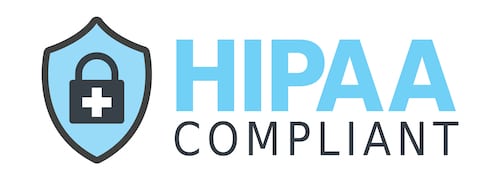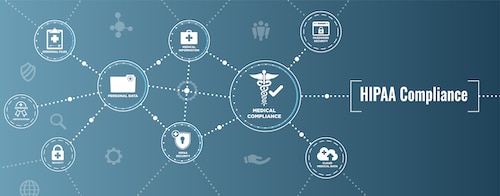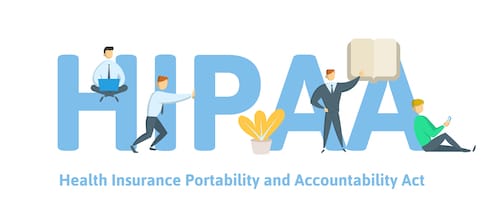What Is The Purpose of HIPAA? – [Updated for 2023]

HIPAA is the Health Insurance Portability and Accountability Act. It’s a central part of protecting patient healthcare information and helping employees transition between jobs. It also allows people to access their medical records at any time securely and potentially share their medical records with others.
So what is the HIPAA privacy rule designed for, and how can employers ensure HIPAA compliance? What role does it play in the healthcare industry? Our guide explains all you need to know about the purpose of HIPAA.
What is HIPAA?
HIPAA came into action in 1996. It constitutes a comprehensive legislative act incorporating several previous legislative acts.
HIPAA rules are somewhat different from many other healthcare acts. It focuses on health data and how patients’ protected health information is handled. The HIPAA privacy rule is designed to ensure that patient data is not only passed securely between healthcare organizations but that patients have access to their healthcare data at all times.
Covered entities include individuals and employers that provide a group health plan or health insurance for employees. Any HIPAA-covered entity subject to the HIPAA privacy rule may be subject to federal and criminal penalties if it is found to handle a patient’s medical information inappropriately. We have a HIPAA training program for employees if you need to get them up to speed about this important law. We also have a write up on the many rules of HIPAA that you should also check out.
What Does HIPAA Do?
The purposes of HIPAA is to:
- Prevent healthcare fraud. Healthcare data should only be available to the relevant parties (including the individual whose health data is being held) at all times.
- Smooth healthcare operations between providers. The Health Insurance Portability and Accountability Act is designed to facilitate smooth transitions between entities in the healthcare industry. This means that individuals still have access to their health data when moving between healthcare providers and/or jobs.
- Protect individually identifiable health information. For companies that offer group policies or health insurance coverage to their employees, the HIPAA privacy rule mandates that organizations follow group health insurance requirements and keep all information electronically protected.
- Standardize medical savings. The HIPAA security rule also covers company-owned life insurance loans for business associates and employees. It sets national standards for tax-related provisions, which include outlawing any tax deduction on interest on health care and life insurance loans.

For Employees
Employees are entitled to data protection regarding their health information. Whether an employee is simply covered by a company’s health insurance plan or is a business associate with coverage included, HIPAA legislation makes it easier for personal health information to be kept secure and confidential.
This applies both when an employee or business associate is in employment and while they are between jobs. The privacy rule makes it easier for health maintenance organizations to record and process electronic healthcare transactions securely.
This means that employees and business associates’ administrative and financial transactions are protected and only visible to appropriate parties and that other healthcare operations may pass smoothly from one provider to the next.
It makes it much easier for healthcare professionals to pick up at the right point, identify relevant healthcare data, and offer appropriate service to individuals and covered entities as soon as possible.
For Employers
Title ii is the part of HIPAA concerned with administrative simplification. The privacy rule makes it easier for employers to manage employees’ healthcare information securely and ensures that secure electronic access is limited only to those who need it.
Compliance with the HIPAA privacy rule protects employers from HIPAA violations and potential penalties for a data breach under federal law.
It is essential that employers offering health plans comply with HIPAA security rules and understand their place in the healthcare industry. Patients’ economic and clinical health is impacted by organizations’ ability to abide by privacy and security rules. It also allows employers to offer greater security to health plan members.
Employers should be aware of the Breach Notification Rule, which was introduced as part of developing health information technology legislation in 2009. The Breach Notification Rule outlines how an employer and/or healthcare provider must proceed when informing an employee that their healthcare data has been breached.
Following this security rule ensures that even if electronic protected health information is compromised, human services can follow up with appropriate safeguards and employers will not be subject to additional criminal or federal penalties.

What is Health Insurance Portability?
This is an important development in health information technology that allows healthcare organizations to transfer a patient’s medical records between providers securely. It is especially relevant when a patient is moving between jobs that may have different group health insurance requirements, and covered entities may use different healthcare providers.
Portability allows for electronic transmission of a patient’s records between covered entities. It ensures that patient data is only visible to relevant parties during this process – health plan members can rest assured that their data is protected by any organization that operates under the security rule.
Electronic health data transfer reduces the need for physical safeguards and streamlines the process of moving sensitive information between HIPAA-covered entities. Insurance portability laws advance several other legislative acts designed to protect patient information by storing it digitally wherever possible and ensuring that access is protected.
What Does Protected Health Information Mean?
The HIPAA security rule aims to prevent information breaches in the healthcare industry. Such breaches can be disastrous not only for healthcare providers but also for companies that offer integrated healthcare plans to their employees.
Protecting information means that a covered entity such as an employer, a healthcare provider, and in-between agencies like healthcare clearinghouses can only access patients’ medical data when necessary. Electronic data interchange means that information is passed swiftly between parties and that healthcare professionals may access it when needed, rather than having to wait for a transfer from another agency.
All parties are subject to features of the privacy rule such as the Breach Notification Rule. It is up to each covered entity to report this to the patient and to the relevant authorities whenever a breach is identified.
When Can Patients Access Their Healthcare Records?
The privacy rule doesn’t just protect sensitive information; it allows patients to continue to access their healthcare information when they’re between jobs or providers. Individuals will still have access to healthcare (and be able to show their new provider that they are eligible for certain healthcare provisions) while between providers. They will also have access to relevant educational programs and helpful medical information.

How Does HIPAA Protect Information?
Electronic transfer of information is at the center of HIPAA privacy laws. Because data transfer is electronic, it reduces the need for sensitive information to be stored physically.
Physical stores of healthcare information are much less secure than digital records. They are also cumbersome to transfer between providers. Previously, if an individual was switching providers, they might have to wait for communication from their previous provider before urgent treatment or top-ups of medication could proceed.
Electronic transfer means that this information can be transferred securely and instantly. HIPAA was designed as a critical update to protect individuals’ access to healthcare when moving between jobs, locations, or simply switching to a new provider.
What is the HIPAA Security Rule?
The security rule is a wide-ranging upgrade to legislation like the Employee Retirement Income Security Act and the Public Health Service Act. It provides guidelines for the healthcare industry on how to react in the case of a data breach, but also protects individuals’ rights and access to healthcare.
Furthermore, it seeks to prevent insurance fraud. The act explicitly outlaws practices such as tax deduction on interest for life insurance loans.
How Does HIPAA Benefit Patients’ Economic and Clinical Health?
Patients are protected from economic difficulties caused by healthcare fraud. This could traditionally make it more difficult for patients to find healthcare coverage or could cost them extra on their healthcare premiums.
By protecting information via electronic transfer and ensuring that all parties are obliged to respond instantly when a breach is identified, patients’ rights are protected. This means that their economic well-being is far less likely to be affected by fraudulent activities than in the past.
Likewise, patients’ clinical health is guaranteed because their healthcare information remains accessible when they are between jobs or providers. This means that they are always able to provide existing health conditions and access appropriate medication or treatment when required.
If a patient suffers an accident during a transfer between providers, they can access their health insurance as usual, even if they are technically “between providers.” Electronic transfer of records means that medical professionals may access these records instantly and offer appropriate treatment.

Does HIPAA Only Affect People Whose Organizations Offer Health Insurance Coverage?
HIPAA affects anyone with private healthcare coverage. It also affects those organizations and the relevant providers and insurers. HIPAA laws bind all parties, and in the case of a breach, responsibility doesn’t fall on the patient.
Organizations offering group plans must be mindful of HIPAA. Understanding and implementing this legislation means they can cover themselves in the case of a security breach and avoid penalties.
These penalties can be steep and may be applied at federal and criminal levels. The minimum penalty for any instance of wilful neglect that hasn’t been addressed appropriately is $50,000, and organizations may be liable for up to $1.5m within a year for repeated breaches.
If breaches are corrected swiftly and are not due to willful neglect, penalties may be as low as $100. It’s well worth keeping abreast of HIPAA regulations for any organization offering a healthcare plan.
Final Thoughts
HIPAA regulations are designed to protect patients from fraud and allow them access to healthcare at all times. They’re also designed to help employers understand their responsibilities and act appropriately if a breach is identified.
If your organization abides by HIPAA rules, you can offer your employees unparalleled healthcare security and protect yourself from fines. It’s well worth building your knowledge and remaining compliant. Hopefully, this short guide on the Purpose of HIPAA will get you on the right track.